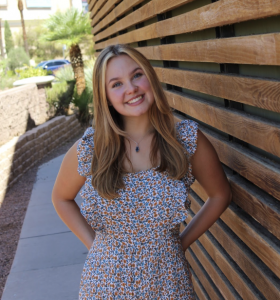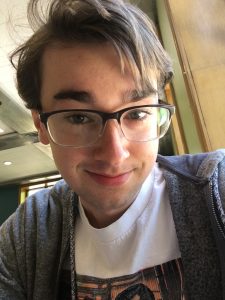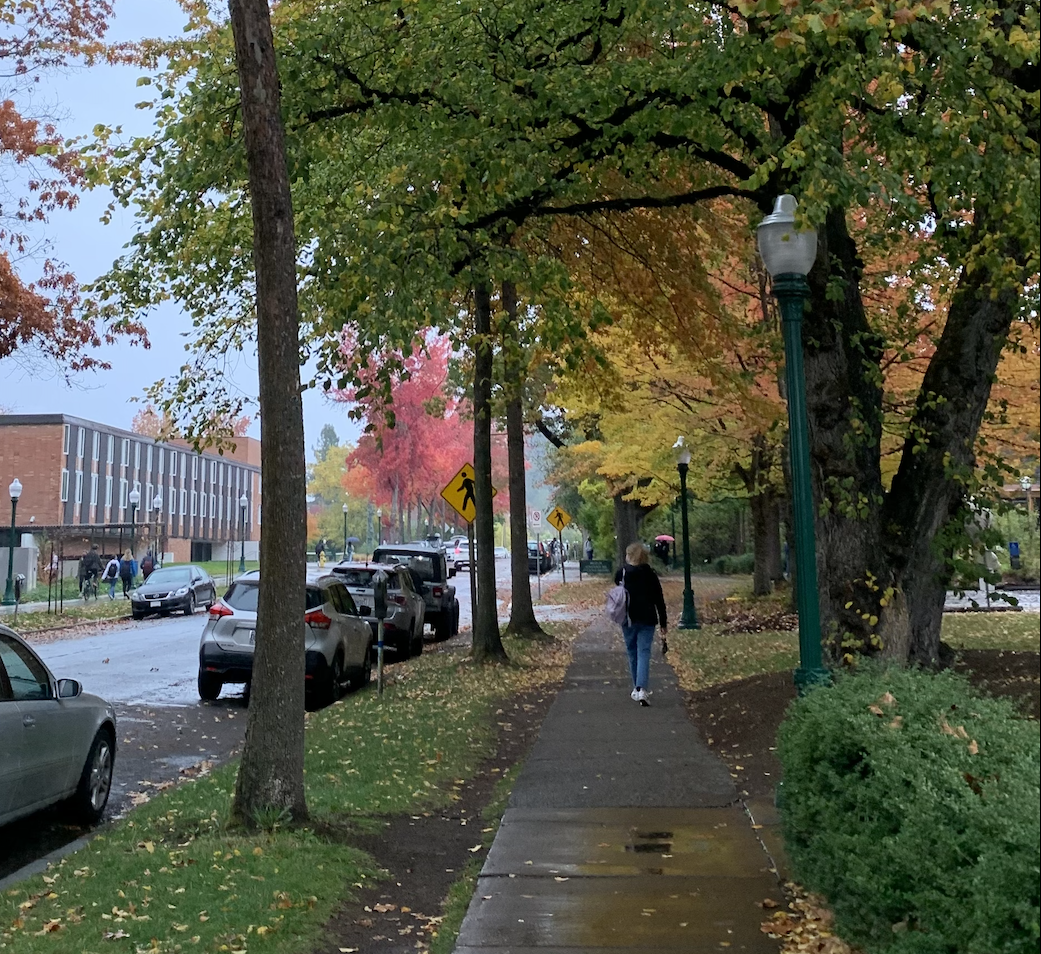Roadblocks in Student Journeys: Mental Health & Disability Access on College Campuses
By Madison Eldridge & Maria Rose, Interns for MindFreedom International & Aciu! Institute
In our early teen years, we both began experiencing challenges in our mental health. Family histories and harsh lived experiences left us both with mood-related challenges, a perceived lack of control, and the ongoing search for security. With hopes of receiving support, we met with psychiatrists, and with our newly cast diagnoses and an orange bottle of pills, we were sent home.

Maria Rose: Intern for MindFreedom International & Aciu! Institute
Our first experience in the world of psychiatry was highly medicalized, and neither of us began seeking alternative treatment until far after being prescribed antidepressants. While our diagnoses weren’t weaponized against us, our lack of support became the foundation for our passion in the world of mental health care and advocacy work.
In the fall of 2021, both of us enrolled in a class titled “Introduction to Disability Studies,” the first class of the disability studies minor sequence. Taught by Besty Wheeler, the two of us learned about the intersections between disability and race, the histories of disability mistreatment, and the power of language, all while coming together as peers and creating the “educational model of disability,” as Betsy called it. It was during one of these classes that guest speaker David Oaks visited. He spoke about his experience of forced psychiatric drugging stating, “somehow I got out.” In sharing his narratives of the dominating medical model and the Mad Pride Movement, David began to recite a centuries-old peasant freedom anthem “Die Gedanken Sind Frei” that translates to “thoughts are free” in German.
Die gedanken sind frei
My thoughts freely flower
Die gedanken sind frei
My thoughts give me power
No scholar can map them
No hunter can trap them
No man can deny
Die gedanken sind frei
With lessons from Betsy Wheeler, the words of David Oaks, and our personal experiences, we began our internship at MindFreedom International with the goal to improve disability access, especially on college campuses.
Transitioning to College with a Disability
Today, Madison is 20 and Maria is 21. We are both attending the University of Oregon and are interns with MindFreedom International and Aciu! Institute. The transition to college can be challenging for everyone, but especially for those with a disability. First experiences of independence, persistent homesickness, finding campus resources, and meeting new peers compound to make the first months, and even years, of college a challenge.

Madison Eldridge: Intern for MindFreedom International & Aciu! Institute
For those with physical and mental disabilities, it can become exceptionally difficult to maintain one’s physical and mental health. For this reason, it is critical that students receive the support they need to succeed in their journey of higher education. Moreover, it is necessary that universities be held accountable for their shortcomings in aiding diverse learners.
Student Anecdotes: Barriers to Access
While the University of Oregon offers services for students experiencing challenges related to disability, many fail to support the current needs of students. In an interview conducted by Maria Rose, a student anonymously states, “I would say that the Accessible Education Center (AEC) is helpful to an extent, but they also sometimes aren’t as helpful as they want to be.” They continue, “I’ve had some very mediocre interactions with advisors there… just kind of not really helping me figure out what’s going to work for me. They just expected that I would know what accommodations I needed.”
The AEC works to facilitate accommodations, tangible support, and resources for both students with disabilities. Working alongside the AEC as a student could mean a multitude of things: testing accommodations, approval of a service animal, or mobility services. For someone who has just transitioned to college, it would be extremely difficult to know what specific accommodation is necessary for them to be successful. Even after attaining accommodations, their implementation varies by the professor. The interviewee recalls this experience of theirs stating, “Some of the professors just like don’t care… they will just like be like, ‘oh well I’m having you do this a certain way because it is conducive to the way I teach.’”
Alongside the AEC, students have access to the University of Oregon Counseling Center. However, the existence of a counseling center is not enough to ensure student support. These centers must be properly staffed with sensitive and trained providers. For example, many University of Oregon students have complained after being placed on a waitlist for a therapist and waiting months for support. Alongside this, one student notes being left on hold with the crisis line for over thirty minutes. Through a recent outreach to university students, many remarked that their counseling centers were unsupportive of their needs. As a whole, these students felt worse after their interactions with university providers.
One student summarizes the problem with campus counseling writing, “They offer accommodations and services, but there is often not enough to cover all students.” Lacking individual support and enough staffing, universities must stop promoting under-resourced facilities as a selling point, especially with something as important as mental healthcare.
At the University of Oregon, there is a massive disparity between the marketing of inclusivity and accessibility and the reality of these supports on campus. With students left unsupported by resources such as the AEC and the Counseling Center, this becomes abundantly clear. Ironically, this month is Disability Pride Month, and the university has yet to state anything on its importance. Meanwhile, they have left the Disability Studies Minor under threat of extinction.
Proposed Solutions
Having looked into problems many students are facing in their experiences of working with the programs, resources, and initiatives provided to college students by the University of Oregon, we need to look at ways we can improve upon the current model. Resources do exist for students inside the AEC, however, those looking into the counseling services and other clubs that promote mental health awareness, often fall short of student needs and expectations. The gap between what a university has to offer and fulfilling student expectations does not need to be supplemented by new programs or additional costs. Universities can apply feedback from students to perform campus outreach and education on the programs currently available.
Ensuring that each student knows their mental health rights and what programs exist if they experience mental hardships they’d like support in handling is pertinent to students’ wellbeing on campus. Additionally, universities must become more aware of any mental health programs that exist within the broader community and not just to utilize these programs when the services at their college are over capacity. This is a great way for students to meet a network of people for support and garnering tools for one’s mental health. Mental health does not come with a one size fits all solution, and universities are responsible for recognizing the flaws in their own resources and programs to accommodate students as best as possible.
Funding for Peer Support Initiatives is Necessary

Gabe C. Jenkins, intern for MindFreedom International & Aciu! Institute
As mentioned in fellow intern Gabe Jenkin’s Blog, peer support functions as an alternative treatment method for mental healthcare “where people with lived experience help others going through a similar life situation.” This valuable form of treatment has been employed by many, either in addition to or in place of pharmaceutical intervention or other traditional forms of management for mental health experiences. One group that has been successfully practicing peer support in communities is Youth Era, a non-profit that uses peer support to spread knowledge on mental health, by training its peer supporters. According to their website, the ASIST model is the most widely used and effective suicide prevention model in the world to “recognize risk, intervene to prevent the immediate risk of suicide, identify resources, and formulate next steps.” This type of training is invaluable to a generation focused on peer support initiatives.
In the paragraph above, the ways universities can make an impact on their models of care without spending additional money are discussed. Yet this can be done with minimal support from the Associated Students of the University of Oregon. Garnering support for allocations of the Incidental Fee, which is paid by students, towards mental health and disabilities resources is a way that monetary investments can be employed to better the mental health experiences of University of Oregon Students. If this funding were to go towards maintaining the Disabilities Studies Minor, which currently is at risk of extinction due to a “lack of funds,” the community of the campus would remain inclusive to those with mental and physical disabilities.
Disabilities Studies being offered as a minor by the University furthers campus and community-wide inclusion, education, and advocacy work for those with disabilities. It is beneficial to the culture of the campus community, and taking this away from students would be a major setback in the Disabilities Rights Movement’s progress. Furthermore, this funding could also support the creation of a club that would be specifically designated as a peer support group for those with self-identified lived experiences of mental and emotional hardship. This would be vital to students who have found this to be a meaningful contribution in their management of their mental health. While this is practiced in many other clubs on campus, there is no club solely designated for this purpose and many groups would benefit from its creation.
If anything in this post has resonated with you, know you are not alone. Students must unite through our common experiences, find unique solutions, and demand better from our universities.
Join us on August 19th, 2022 at 2 pm PDT via Zoom to discuss some of these ideas further in depth at the MindFreedom International Webinar “Mental Health Lived Experience: Action and Awareness in College Campuses.” Panelists include two recent college students with lived experience of mental health, Madison Eldridge and Arnicia Gillyard, Martin Rafferty, and David Oaks. You my contact our intern team at interns@mindfreedom.org.
References
Jenkins, Gabe. “Teens Need Access to Mental Health Alternatives.” MindFreedom International (MFI), 8 June 2022, https://mindfreedom.org/affiliate-sponsors/sc-blog/teens-access-to-mental-health-alternatives/.
“Peer Support.” Youth Era, https://www.youthera.org/peer-support.
Unknown author, “Die Gedanken Sind Frei.”


